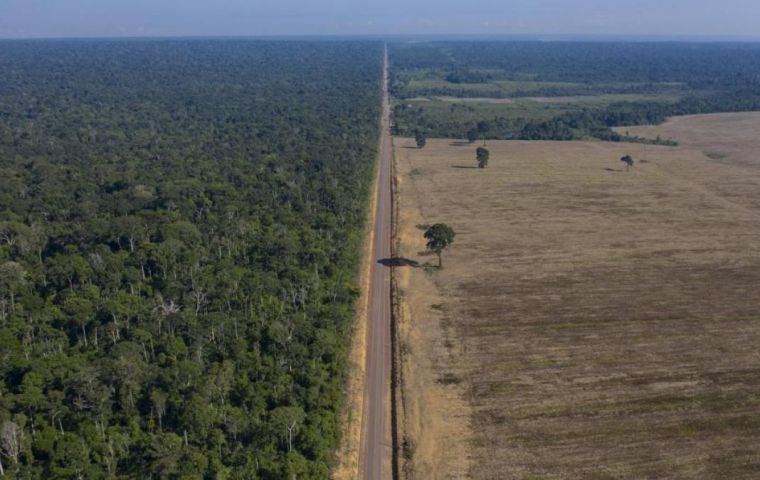MercoPress. South Atlantic News Agency
Food companies and grocers urge commodity suppliers to refuse soybeans from deforested areas in Brazil
 Nestlé, Unilever, McDonald's, Walmart Inc., Tesco Plc and other consumer-goods companies demanded in a letter that the traders refuse to trade soy from deforested regions
Nestlé, Unilever, McDonald's, Walmart Inc., Tesco Plc and other consumer-goods companies demanded in a letter that the traders refuse to trade soy from deforested regions Some of the world’s largest food companies and grocers urged commodity suppliers including Archer-Daniels-Midland Co, Bunge Ltd, Cargill Inc and Louis Dreyfus Co. to stop trading soybeans associated with deforestation in Brazil’s Cerrado region, a savanna that is a hive of biodiversity and one of the country’s most important carbon sinks.
Nestlé, Unilever, McDonald's, Walmart Inc., Tesco Plc and other consumer-goods companies demanded in a letter that the traders refuse to trade soy from deforested regions of the Cerrado starting next year.
“We source much of our soy from the Cerrado region, so it’s vital we play a leading role in protecting this biodiverse region for future generations,” Anna Turrell, Tesco’s head of environment, said in a statement on Tuesday.
“We’re calling on traders to step up their own commitments and implement robust monitoring, verification and reporting systems within the region, and set a 2020 deforestation and conversion-free cut-off date for soy from the Cerrado.”
The letter was sent by more than 160 signatories of the Consumer Goods Forum’s Cerrado Manifesto Statement of Support. Other recipients were Cofco International and Viterra, a Glencore Pls. subsidiary. Five of the six traders responded though none agreed to the requests outlined, according to the statement from the consumers.
Companies represented by Abiove, Brazil’s soy processors group, refuse an abrupt cut-off date for zero deforestation in Cerrado as proposed since it may harm farmers who are complying with Brazilian law, according to Abiove’s head Andre Nassar.
“We understand that Europe doesn’t want to buy soybeans from deforested areas, but we need to give a chance to producers to adapt themselves to it,” Nassar said on Tuesday.
Abiove supports the idea of offering financial compensation for farmers who agree with zero deforestation in Cerrado, a more advanced practice than required by Brazil’s environmental law. The regulation allows growers to clear 65% to 80% of the native vegetation in private areas.
Cargill, which is not a signatory of the support statement, said it recognizes “the urgency to address deforestation and native vegetation land conversion in the Cerrado.” More than 95% of its 2019 crop was free of deforestation and such conversion, according to a statement.
“Cargill will not supply soy from farmers who clear land illegally or in protected areas, and we have the same expectation of our suppliers,” the company said.
About 60% of the Brazil’s soybeans are grown in the Cerrado region, which has become a focal point of climate-change activism in recent years as President Jair Bolsonaro prioritized expanding economic interests including agriculture over ecological conservation.
Due to the deforestation associated with soybean farming in Brazil, companies are increasingly rejecting purchasing the commodity.




Top Comments
Disclaimer & comment rules-

-

Read all commentsBy this reasoning, the rest of the world should boycott ADM and other corn traders for not allowing the buffalo to roam on unimproved prairie lands
Dec 16th, 2020 - 02:17 pm 0If you ignore the intervening 150 years or so.
Dec 16th, 2020 - 05:37 pm -2Commenting for this story is now closed.
If you have a Facebook account, become a fan and comment on our Facebook Page!